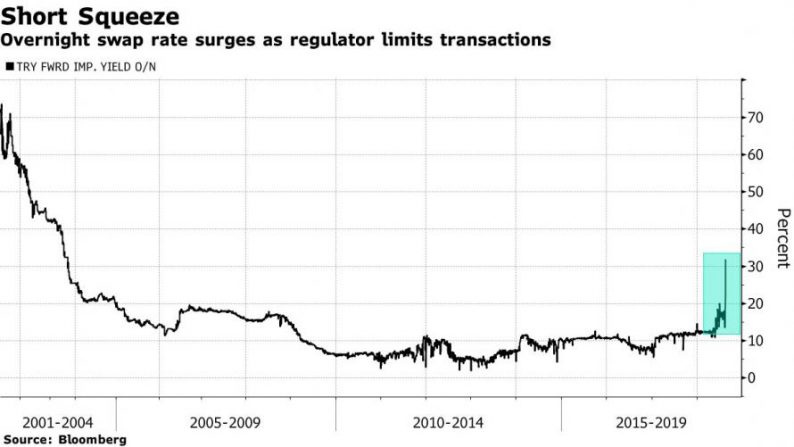In a day in which the dollar set new highs against all emerging market pairs and global risk was on the defensive, the Turkish Lira bucked the trend and extended its rapid rebound from record lows, after Turkish regulators imposed new “soft capital controls” to prop up the battered currency, making it even harder for banks to short the currency through the swap market.
One day after Turkey suspended mark-to-market for banks in a bid to offset fears about debt rollover and capital shortfalls, the Ankara-based Banking Regulation and Supervision Agency (BDDK) announced that the total amount of foreign currency and lira swap and swap-like transactions can’t exceed 25% of banks’ legal shareholder equity; the announcement came just 48 hours after a 50% was imposed on Monday, which however failed to make much of a dent in the selloff.
The latest move limits funds’ access to lira liquidity in the offshore swap market and makes it harder for them to borrow the currency from local lenders and short it. The rate on overnight dollar-lira swaps surged more than 12% points to 34.5%, the highest level since 2003.

“They are killing offshore lira liquidity to stop foreigners shorting the lira,” said Timothy Ash, a strategist at BlueBay Asset Management in London.
Then again, this strategy – which just recently was attempted by China – tends to have a very short-term effect, as it does nothing to alleviate the underlying reasons behind a currency selloff.
For now however it is working, and the lira jumped for a second consecutive day, surging as much as 7% against the dollar with the USDTRY briefly sliding below 6.00, reversing much of the decline triggered by tensions with the U.S. Those tensions have been centered on a dispute over the detention of an American pastor, which resulted in tariffs and sanctions. The dispute exacerbated existing concerns about President Recep Tayyip Erdogan’s unorthodox approach to economic policy.











Leave A Comment